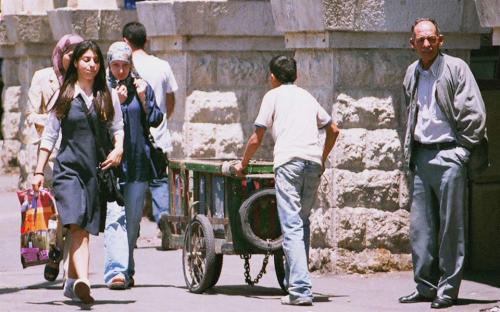New jobs and business loans empower families in occupied Palestinian territory – UN agency
Another 8,000 families in the occupied Palestinian territory will get jobs and small business loans, the United Nations development agency Monday said, as part of a partnership implemented with the Palestinian Authority and funded through the Islamic Development Bank (IDB).

A child porter working the busy streets of East Jerusalem.
“The $50 million will go towards the ongoing work of the Deprived Families Economic Empowerment Programme (DEEP), an initiative that has changed the lives of thousands of poor Palestinian households by helping family members become self-reliant,” according to a news release from the UN Development Programme (UNDP).
The 30-month DEEP works with local non-governmental organizations and microfinance institutions to provide financial and non-financial services to meet the needs of the poor and very poor families in Palestine, including seed capital, technical assistance and small loans.
Funded through the IDP, the programme receives additional financing from the Governments of Japan, Sweden and New Zealand.
Since its launch five years ago, the first phase of the programme created employment opportunities for 12,000, close to half of them women-headed households, UNDP reported. In addition, the jobs contributed over $20 million per year to the Palestinian gross domestic product (GDP).
The second phase will expand the work and develop additional public social services at the district level, according to the UN agency.
“From now on, these families will not be left alone to sink back into hardship,” said Frode Mauring, UNDP Special Representative of the Administrator in the occupied Palestinian territory. “They will be supported by governmental and non-governmental protective social safety nets.”
Some 230,000 households live below the poverty line in the occupied Palestinian territory. Of which, some two-thirds could be operating profitable economic activities, according to UN labour figures.
Source: UN News
- 360 reads
Human Rights
Fostering a More Humane World: The 28th Eurasian Economic Summi

Conscience, Hope, and Action: Keys to Global Peace and Sustainability

Ringing FOWPAL’s Peace Bell for the World:Nobel Peace Prize Laureates’ Visions and Actions

Protecting the World’s Cultural Diversity for a Sustainable Future

Puppet Show I International Friendship Day 2020

